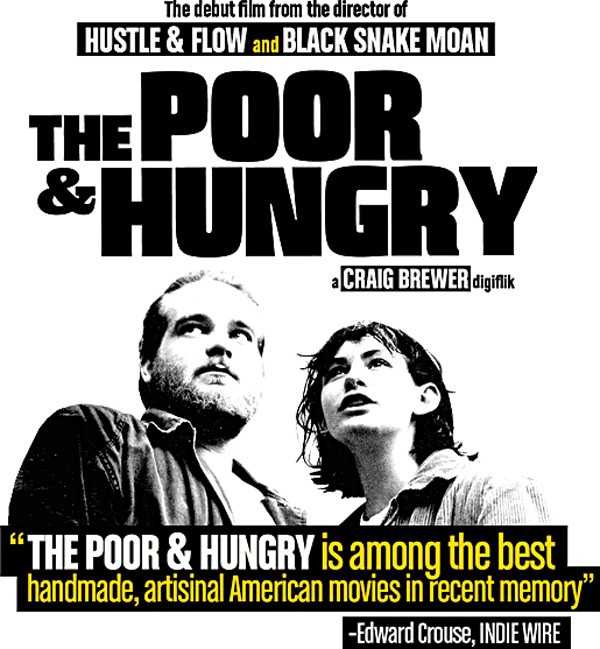So a gaggle of comedians from Memphis walk into a bar in Western Arkansas …
No, this isn’t the beginning of a joke. It’s an origin story for Memphis’ most popular monthly, game-based comedy event. You Look Like — so named because the competition’s mean-spirited jokes all begin with the words, “You look like” — recently tickled film and television director Craig Brewer’s funny bone, so now it’s being developed as a streaming digital series.
You Look Like is beginning to look like a comedy institution in the making, but back in the summer of 2015, the embryonic thing that rapidly evolved into You Look Like (YLL), just looked like local funsters Katrina Coleman and Benny Elbows swapping off-the-cuff insults to pass time over a long, boring haul to Fayetteville. Once the other comedians on the evening’s bill were introduced to the concept, they jumped right in and started playing along, too, saying terrible things to each other, such as: “You look like you really believe you’re going to get custody this time,” or “You look like the youth minister who needed a talking to.”
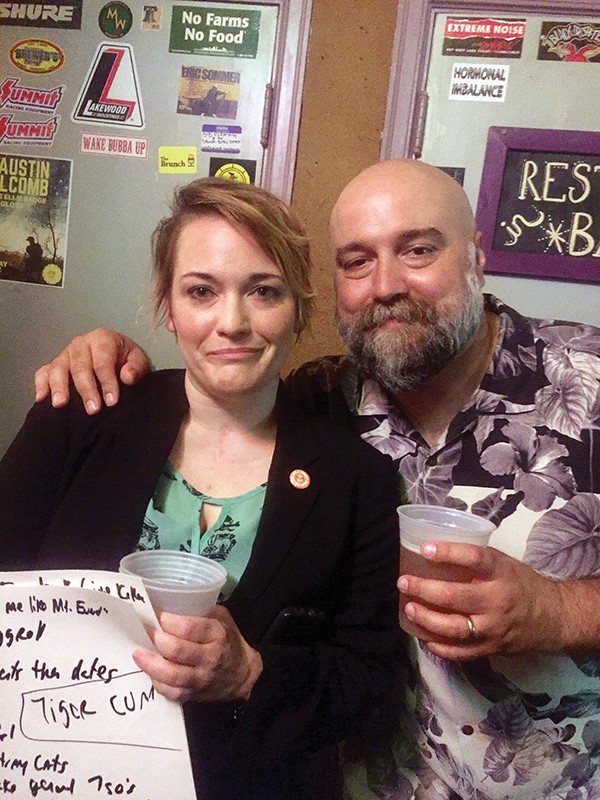
Amanda Walker and Craig Brewer in the bar that inspired Brewer’s The Poor & Hungry
“One time somebody told me I look like Malcolm X-Man,” says Black Nerd Power host Richard Douglas Jones, an early YLL player and convert.
The seminal Arkansas, gig at Nomads Music Lounge (regrettably titled “Memphis in Fay”) started late, in part because the Bluff City comics couldn’t stop playing their fun, new game. When the comedic bloodsport finally broke up, comic and YLL co-founder Tommy Oler grabbed Coleman by the elbow and told her the silly, mean, hilarious thing she’d started needed to grow into something bigger.
“I wasn’t sure. I just thought it was a thing I like to do,” says Coleman. For her, You Look Like was a warm-up exercise — the funny person’s equivalent of a gymnast stretching before a tumbling routine.
Oler took the idea to the P&H Cafe, where he was already hosting a popular Thursday night open mic. The idea was instantly green lit, and it wasn’t long before the eclectic Midtown bar famously associated with poor and hungry artists had to reconfigure its seating to accommodate bigger and bigger crowds turning out for comedy.
“I remember when I’d have 10 or 15 people at one of my shows, and I’d think it was the greatest thing,” Coleman says. “I’d get all excited and call my mom. Now, if there are only 50 or 75 at a show, I wonder if there’s some big concert at Minglewood Hall or something.”
Now, when episodes of the accompanying YLL podcast post late, out-of-town subscribers send grumpy messages. “It’s this really weird show that audiences seem to like and that the comics love to do,” Coleman says, floating a theory: “If you really love somebody, you’ll cut their heart out for a giggle.”
For all the terrible things being said on stage, the love inside the P& H is thick and sticky when, over the course of a week, Brewer and his local production team shoots the entire pilot season for a digital You Look Like series.
“You got robbed,” the winner of one round calls out, chasing down his opponent. “I know. I totally beat you,” the loser shouts back. Nobody’s angry. They’re all in this together.
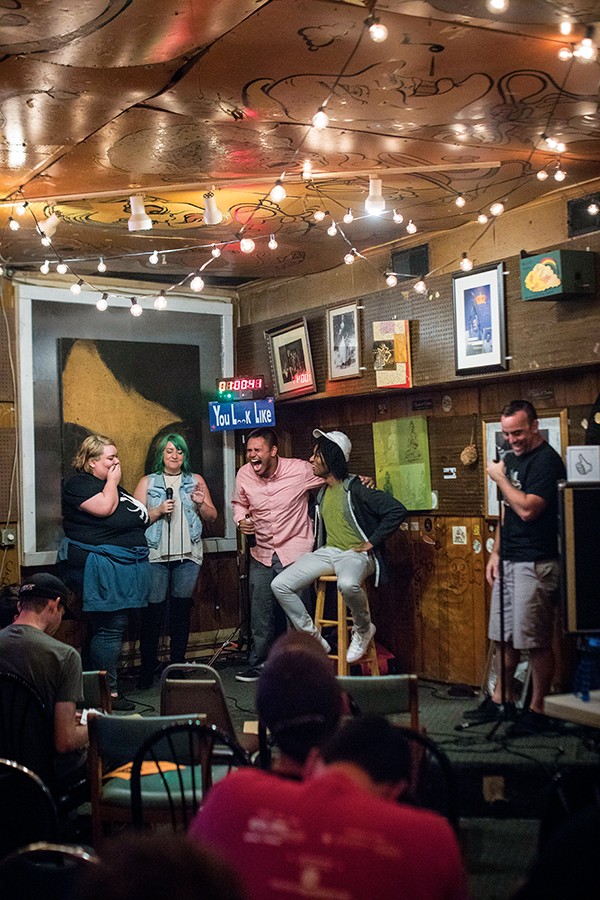
“I’m not drunk enough to cry,” Coleman announces from the stage as the camera crew prepares to shoot the last five episodes of the 10-episode trial season. “But set your watches.”
Coleman, who certainly looks like the person most responsible for assembling the current big tent of modern Memphis comedy, then gestures to a ridiculous, clearly homemade crown spinning on a turntable just offstage: the winner’s prize.
“It’s still the You Look Like show,” she assures the “studio audience,” acknowledging that, in spite of the many physical upgrades to her show’s homemade aesthetic, “I made that motherfucker in my living room.”
A machine pumps fog into the room, standing in for the P&H’s famously thick cloud of cigarette smoke. Local writer/director Morgan Fox orders the cameras to roll, and the games begin in earnest.
The rules for You Look Like couldn’t be simpler. Two comics stand face to face, trading appearance-based insults: “You look like heroin might improve your life.” Or “You look like the Sorting Hat put you in House of 1,000 Corpses.” Like that. The meaner it gets, the more respect you can feel radiating from the combatants. When a round ends, the audience chooses a winner, and the loser has to gaze into a mirror of shame and play the game over again, solo, hurling insults at him/herself.
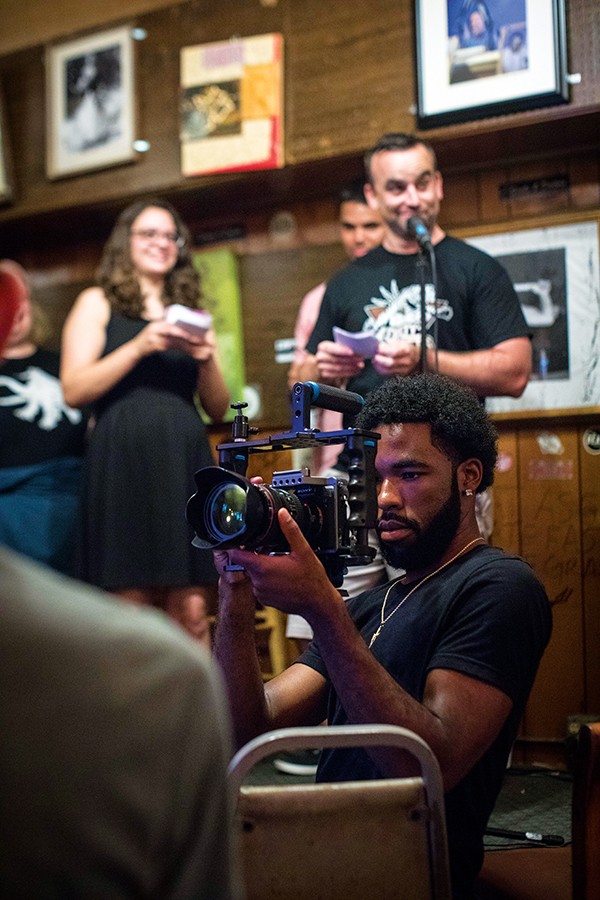
Brewer encountered the You Look Like Show while attending the 2016 Memphis Comedy Festival. The Hustle & Flow filmmaker had no idea that such a mature comedy scene had grown up in the artsy little beer joint at the center of his own filmmaker origin story.
For that festival, the show was moved to the Hi-Tone, and Brewer had initially assumed it was put on by a visiting troupe of comics from Chicago.
“I was like, ‘Wow, it’s so great that this touring group came in and did this,'” Brewer says in a phone interview from Los Angeles (where he recently added a new credit to his resume: co-executive producer of the hit show, Empire). Brewer was immediately corrected by fans who told him it was, in fact, a Memphis-based show that had been running for about a year at the P&H.
“Do you know where the P&H is?” someone asked. “Yeah,” Brewer answered. “I think I might know where that is.”
Seeing Brewer at work again inside the P&H causes epic déjà vu. The Madison Avenue bar, with its rotating cast of oddball regulars inspired his first movie, The Poor & Hungry. In the late 1990s and early 2000s, when he was still an aspiring filmmaker and part-time bookstore employee, Brewer would go to the bar to write his screenplays, shoot scenes, or screen daily “rushes” on the P&H’s ancient TV.
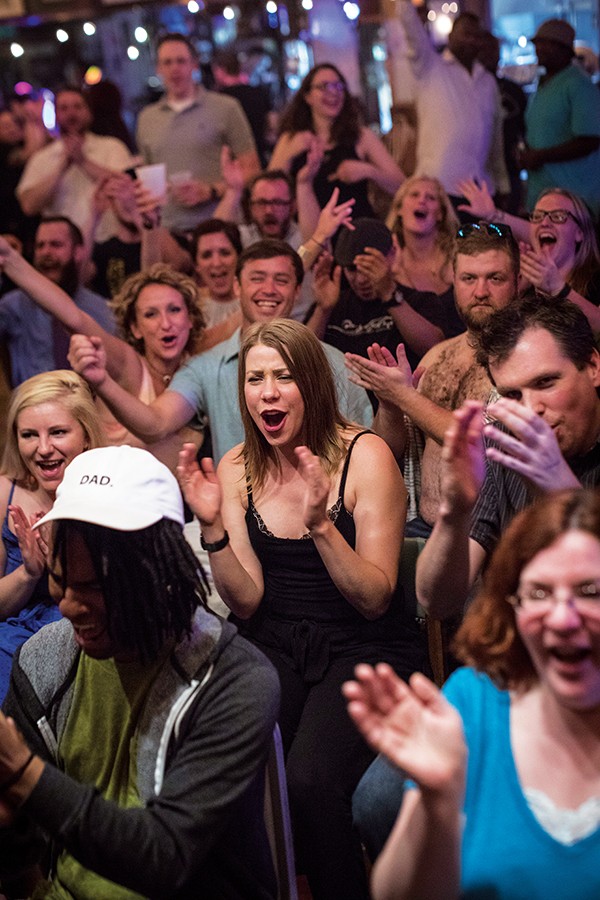
Although The Poor & Hungry never received wide theatrical distribution, the award-winning digital feature, shot on an impossibly low budget of $20,000 with a two-man crew, became Brewer’s Hollywood calling card. When other wannabes were slinging pitches, he was mailing out VHS tapes of a little movie about life at the P&H Cafe that arguably helped step up Hollywood’s digital shift.
“I felt like grandpa,” Brewer says, shocked but not all that surprised by the revelation that he and YLL shared a creative womb.
The following June, two-months after the comedy festival, Coleman received an unexpected voicemail: “Hi, this is Craig Brewer. I make movies. I saw your show and was wondering if you’d maybe like to get together and talk about it.”
Like any any mother faced with sudden, unknown change, Coleman’s initial response was caution. “Please, please, Hollywood, don’t take my ugly baby away,” she pleads emphatically, recounting her initial worry. “But Craig was great. He walked me through the whole contract and explained everything.” All Coleman really needed was assurance that the live show would be always be hers to do with as she sees fit, which had been the plan all along.
“See, the whole live show fits in this little, pink duffle bag,” Coleman says, giggling. As long as she could continue running it out of the P&H and taking it on the road, Coleman says she was up for just about anything else that might happen.
Brewer has always scouted opportunities for exporting Memphis talent and weirdness. In the 1990s, he shot footage of the city’s burlesque scene, resulting in his early short, Clean Up in Booth B. His team-up with MTV on $5 Cover resulted in Midtown’s rock scene playing a semi-fictionalized version of itself.
Unlike earlier projects, where Brewer was starting from scratch, You Look Like was complete and alive. Adapting it as a digital series was additionally enhanced by an all-local crew he’s been collaborating with for a decade and an uncommonly united comedy scene that’s spent the last five years learning to work together.
It’s like what comic Josh McLane says, making his way from the stage to the writers room: “I get paid the same if I win or lose. All that matters is if it’s funny.” That was the dominant attitude backstage during the YLL shoot, giving the whole event an old-school Memphis wrasslin’ vibe. Unlike wrasslin’, outcomes to the matches weren’t predetermined, but the beefs aren’t real, and everybody’s working together to bring serious pain from the top-rope.
“I’m addicted to this feeling now,” Brewer says, remembering the electricity in the room when the comedians hired to write jokes between rounds gathered around the P&H’s pool tables and built their insult database.
Richard Douglas Jones described the writing process as “completely organic.” When one vein of material ran dry, somebody would open another. “I will reinvent the wheel and run you over with it again and again,” he said. Brewer had one big concern. “There needed to be something positive coming out of You Look Like,” he says. “If you were looking at comedians tearing each other apart, you need to feel that they are friends. So, in a weird way, it could be inspiring.”
The backstage cooperation insured that that would be the case. “I left the experience asking, ‘How can I create that again,'” Brewer asks. “Can I go narrative with it? If we did a TV show, what would it be? And what are the jokes?”
That wasn’t the only feeling Brewer left with. He’d drifted away from the P&H after the passing of its colorful proprietress Wanda Wilson, the big-wigged protector of artists, misfits, and backgammon gamblers. “For a while that place lost its energy,” Brewer laments. Working on YLL assured him that the bar’s original spirit is alive and well under the current management.
So what’s next for YLL? The live show continues as usual but now with a new guest host every month. What happens with the pilot series is anybody’s guess, but there are some interesting possibilities: Maybe it gets snapped up right away by a streaming content provider. Or maybe the original series, like The Poor & Hungry, simply becomes a calling card — something Brewer can screen on his phone when he’s pitching ideas. Maybe a producer likes the web series but wants to know if the show can be adapted as a reality show or narrative comedy. “So many times you walk in with a pitch document, and you just don’t know how it’s going to turn out,” Brewer explains. “The network might say, ‘Oh, that’s great, but we want it with Snapchat stars.'”
YLL was a perfect catch for Brewer, who’d been actively looking for right-sized projects for his Memphis-based company BR2 and longtime collaborators like David Harris at Gunpowder & Sky, a production company co-founded by Van Toffler, a former MTV executive instrumental in purchasing Brewer’s Hustle & Flow at the 2005 Sundance Film Festival. He sums up YLL‘s appeal — particularly for companies looking for unscripted material — in one exclamatory sentence: “Oh my God, you can highlight 20 comedians per season, and it’s already a living thing!”
Brewer thinks a few scenarios seem more likely than others. “These days, there are celebrities who want their Facebook page — or whatever — to be a channel. So there are comedians and celebrities who might buy it just to put on their channel,” he explained.
“And there are networks who might say, ‘Okay, this works on the digital level; what does this look like on the network level?’ But what I really wish is that we can take what we’ve made and just keep making more of that. We just made 10 episodes this first time, but if we do it again, we can make 50. Just plan for three or four solid weeks of work, where we just go in and bang it out.”
Oler, who no longer hosts the live show but remains affiliated with the digital project, says it’s exciting to imagine what YLL might be like as a movie or a sitcom. But he can’t shake the joy of knowing, wherever it goes, it started with a bunch of knuckleheads insulting each other on the patio at Nomads Music Lounge in Fayetteville.
“I’m just really thankful to have had a chance to work on this,” he says. Oler and Coleman are funny co-founders; they don’t agree about much. But they do agree that, given an opportunity to show its stuff, the Memphis comedy scene stood up.
The You Look Like Show is the third Saturday of every month at the P&H Cafe. Doors at 8 p.m. show at 9 p.m.
You Look Like a List
What comprises a perfect you look like insult? It has to walk a fine line between credibility and the absurd. Some require context, some are just funny no matter who they’re aimed at. Here’s a completely subjective list of great You Look Like lines.
You look like:
You support displaying the Confederate flag, but only because you don’t have any other good towels.
You masturbate with ranch dressing.
People who look like their dogs.
The most well adjusted person here, surgically.
One more sandwich and that shirt’s over.
You ask to speak to managers.
You regularly delete your search history.
Your head mole makes all your decisions.
You think the Dakota Access Pipeline is a porn trilogy.
The target audience for Buzzfeed articles.
You pronounce the L in Salmon.
You grew up outside a trailer.
Your spirit animal is a chain wallet.
You fucked up the proposal because you left the ring in your other cargo shorts.
You don’t mind talking to people while they’re using the bathroom.
You broke someone else’s ankle auditioning for Grease.
You were designed by scientists for the purpose of disappointing women.
Birdwatching makes you horny.
Group photos are always your idea.
Your husband hides your yoga pants.
The side bitch of Frankenstein.
God swiped left.
The guy other guys are totally okay letting their girlfriends hang out with.
You’re still waiting to hear back about that job.
Your dad is more proud of his other family.
